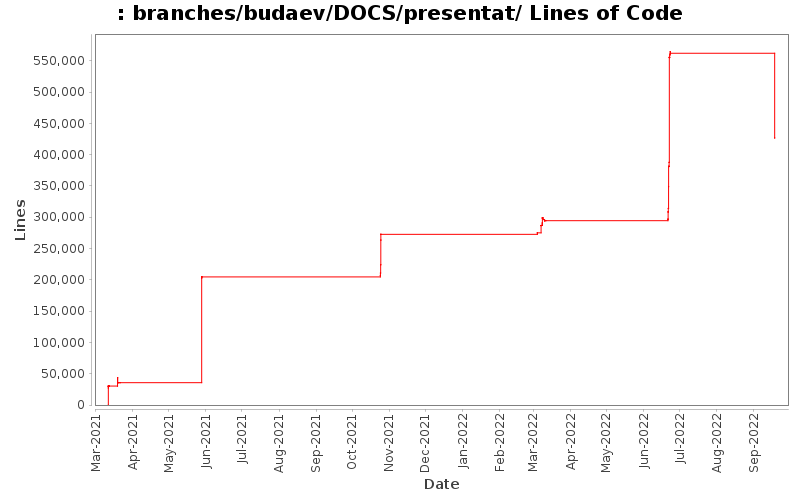[root]/branches/budaev/DOCS/presentat
![]() img
(18 files, 1520 lines)
img
(18 files, 1520 lines)
![]() templates
(0 files, 0 lines)
templates
(0 files, 0 lines)
![]() workshop-sapience-20210112
(2 files, 77543 lines)
workshop-sapience-20210112
(2 files, 77543 lines)

| Author | Changes | Lines of Code | Lines per Change |
|---|---|---|---|
| sbu062 | 72 (100.0%) | 753121 (100.0%) | 10460.0 |
small adjustments making presentation better for sending out
3588 lines of code changed in 1 file:
string added for solomonoff
2251 lines of code changed in 1 file:
pixelise p5
4854 lines of code changed in 1 file:
tsotsos attention
10647 lines of code changed in 1 file:
add tsotsos
16617 lines of code changed in 1 file:
small changes
13247 lines of code changed in 1 file:
figure p35 only
606 lines of code changed in 1 file:
small adjustments, optimal E
10332 lines of code changed in 1 file:
more or less complete
11449 lines of code changed in 1 file:
nearly all
175812 lines of code changed in 1 file:
save before svn meeting
8881 lines of code changed in 1 file:
morning, first edits
2810 lines of code changed in 1 file:
late changes
7003 lines of code changed in 1 file:
before going to sleep
34296 lines of code changed in 1 file:
done many
38384 lines of code changed in 1 file:
bayes, dyno and cod
5264 lines of code changed in 1 file:
bayes
759 lines of code changed in 1 file:
so far 10
11450 lines of code changed in 1 file:
done outline
306 lines of code changed in 1 file:
template for seminar
"Philosophical foundations of animal decision-making and
cognition"
I will write a better talk description later, but the idea was to (1) point
to the stimulus-response dogma (SR) and how it is rooted 17-18 century
empiricist philosophy, "associationism," behaviorism, early ethology
and modern behavioural ecology; (2) outline a framework for complexity
(vs. simplicity), show that the intuitive understanding of complexity and
the notion of complexity implicit in empiricist philosophy can be naive (it
could reflect human evolved cognitive traits) and misleading; (3) point that
the SR dogma of "simple association" as the "null hypothesis" is wrong; (4)
briefly describe the foundations of Solomonoff's theory of universal induction
(math of Occam's razor), and algorithmic complexity (Kolmogorov-Chaitin). (5)
outline an alternative framework that integrates
- Tinbergen's 4 questions
- Marr's levels of analysis for computational system
(6) Integrating causal inference with fitness provides a pathway for the
study of the evolution of animal decision-making and cognition.
With this framework, some problems (e.g. penotypic gambit) can be easily
solved, interesting questions (e.g. baseline/spontaneous activity) largely
ignored in the SR dogma can be studied, while some intriguing things like
innovation, creativity and consciousness can be (better) approached.
2179 lines of code changed in 1 file:
added images of jg and sb
2240 lines of code changed in 1 file:
small adjust p5
31 lines of code changed in 1 file:
notes: five freedoms (p2)
2229 lines of code changed in 1 file:
deleted reentrant slide
2304 lines of code changed in 1 file:
some initial changes after Jarl comments
4113 lines of code changed in 1 file:
use latex via svn p13
4455 lines of code changed in 1 file:
fix symbol format p13
1971 lines of code changed in 1 file:
15 pages done
9773 lines of code changed in 1 file:
predictibve decisions image
3934 lines of code changed in 1 file:
add allostasis
2268 lines of code changed in 1 file:
flip fish psycho image
205 lines of code changed in 1 file:
added pic from balchen
68 lines of code changed in 1 file:
added jaguar sofa images
110 lines of code changed in 1 file:
added fish psycho image
158 lines of code changed in 1 file:
definitions
90 lines of code changed in 1 file:
upper bar added to avoid white edges
64 lines of code changed in 1 file:
add linked image with transparency
11678 lines of code changed in 1 file:
7 pages is enough for 10-15 min
146 lines of code changed in 1 file:
basic template with title page
171 lines of code changed in 1 file:
was misplaced
2179 lines of code changed in 1 file:
(31 more)